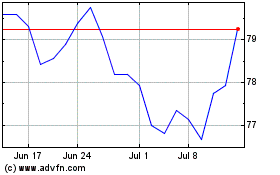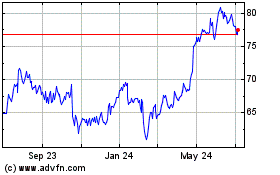By Rajesh Roy and Vibhuti Agarwal
NEW DELHI -- India has temporarily suspended vaccine exports as
the government gives priority to an expansion of its domestic
immunization campaign, according to people familiar with the
matter, in a move that threatens to disrupt the distribution of
doses to the developing world.
India's biggest vaccine maker, the Serum Institute of India, has
been supplying millions of doses of AstraZeneca PLC's vaccine to
countries around the world, as well as Covax, the United
Nations-backed effort to provide vaccines to poor countries.
Gavi, a global health organization involved in the Covax
initiative, said export licenses were being delayed as the demand
for vaccines increased in India. "Covax is in talks with the
government of India with a view to ensuring deliveries as quickly
as possible," Gavi said.
AstraZeneca didn't immediately respond to a request for
comment.
The Indian government hasn't made any formal statement on
vaccine exports. A spokesman for India's foreign ministry declined
to comment. A spokeswoman for India's Ministry of Health and Family
Welfare also declined to comment.
An Indian government official said exports could be suspended or
delayed until the end of April, due to the recent surge in
infections and the expansion of the government's vaccine program.
Exports could also resume earlier depending on supplies, he
said.
On Tuesday, the government said it was expanding its vaccination
drive to those older than 45. Previously, it was only for medical
workers, those older than 60 and people above 45 with
comorbidities.
As of Thursday, India had vaccinated more than 53 million
people. It is now vaccinating around two to three million people a
day. Its target is to inoculate 300 million by August.
India has already exported more than 60 million doses to 77
countries, mostly from the Serum Institute through a mix of
donations, commercial agreements and the Covax initiative.
Those exports included five million doses to the U.K., four
million to Brazil, seven million to Morocco and three million to
Saudi Arabia in January and February as part of commercial deals.
The countries had sought additional supplies, which would be
delayed, people familiar with the matter said.
The most recent exports were 132,000 doses to South Sudan on
March 22, according to the foreign ministry's website.
India struggled with both delivery logistics and vaccine
hesitancy during the initial phase of its campaign, but supplies
now appear to be the problem, said Ramanan Laxminarayan, an
epidemiologist at the Center for Disease Dynamics, Economics &
Policy, a research think tank based in Washington, D.C., and New
Delhi.
"It may be a challenge to be able to meet India's needs and
serve all these other countries as the ability of India's system to
deliver vaccine ramps up," he said.
The Indian official said a new production facility in the
southern city of Bangalore for vaccine maker Bharat Biotech was
expected to be up and running by the end of April or early May,
easing the squeeze on supplies.
Russia's Sputnik V vaccine, as well as vaccines from Johnson
& Johnson and Indian pharmaceutical company Zydus Cadilla, were
expected to begin being manufactured and distributed in India by
May, which would further increase the scope for exports, the
official said.
India has been one of the hardest hit countries in the world by
Covid-19, trailing only the U.S. in the total number of infections
from the start of the pandemic. India recorded a peak of slightly
below 100,000 new daily infections in September, before a gradual
decline. Infections dropped to below 9,000 new cases in early
February, but have steadily increased since then.
Fresh cases have shot up in recent weeks. Health experts say the
surge is mostly due to more reopening and relaxation of
restrictions, including increased travel and more superspreader
events, such as weddings, large religious gatherings and political
rallies for coming state elections. Tens of thousands of
spectators, many without masks, gathered inside a stadium earlier
this month for a cricket match in a stadium in Ahmedabad, in
Gujarat state.
"A false sense of security has prevailed. When the guard is
down, the virus spreads," said T. Jacob John, a retired professor
of virology at the Christian Medical College in the southern city
of Vellore.
On Thursday, India reported 53,476 new Covid-19 infections in
the past day, the highest level in five months, according to the
health ministry. Much of the recent surge has been centered in the
western state of Maharashtra, home of India's financial capital,
Mumbai.
A new novel variant of the coronavirus has been detected in
India, the health ministry said Wednesday, although so far not in
sufficient numbers to establish a direct link to the rapid increase
in infections across some parts of the country. The state of
Rajasthan said Thursday it planned to cancel celebrations around
the religious festivals of Holi and Shab-e-Barat because of
Covid-19.
Asha Nagpal, 71, was waiting in line to get her first dose of a
vaccine earlier this week. She said fear of the virus dissipated as
cases started to drop, and people were more afraid of taking
vaccines than getting infected. With the recent surge in
infections, she said people are realizing the importance of
vaccines.
"We feel it is our only safeguard against Covid-19," she
said.
--Shan Li contributed to this article.
Write to Rajesh Roy at rajesh.roy@wsj.com and Vibhuti Agarwal at
vibhuti.agarwal@wsj.com
(END) Dow Jones Newswires
March 25, 2021 13:02 ET (17:02 GMT)
Copyright (c) 2021 Dow Jones & Company, Inc.
AstraZeneca (NASDAQ:AZN)
Historical Stock Chart
From Mar 2024 to Apr 2024

AstraZeneca (NASDAQ:AZN)
Historical Stock Chart
From Apr 2023 to Apr 2024
